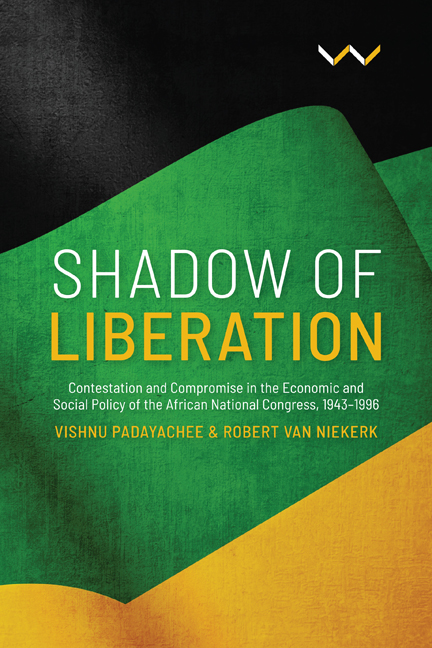 Shadow of Liberation
Shadow of Liberation Book contents
- Frontmatter
- Contents
- Acronyms and abbreviations
- Preface
- Acknowledgements
- Chapter 1 The Context of Economic and Social Policy-Making in the ANC
- Chapter 2 African Claims, the Freedom Charter and Social Democracy, 1943–1960
- Chapter 3 Incarceration, Exile and Homecoming, c.1960–c.1991
- Chapter 4 Economic Policy Debates during a Decade of Liberation, 1985–1993
- Chapter 5 On the Way to GEAR, 1994–1996
- Chapter 6 Making Sense of the Economic Policy Debates
- Chapter 7 South African Reserve Bank Independence
- Chapter 8 The Politics of Health Policy-Making in the Transition Era, 1990–1996
- Chapter 9 Interpretation and Conclusion
- Notes
- Bibliography
- Index
Chapter 3 - Incarceration, Exile and Homecoming, c.1960–c.1991
Published online by Cambridge University Press: 20 January 2022
- Frontmatter
- Contents
- Acronyms and abbreviations
- Preface
- Acknowledgements
- Chapter 1 The Context of Economic and Social Policy-Making in the ANC
- Chapter 2 African Claims, the Freedom Charter and Social Democracy, 1943–1960
- Chapter 3 Incarceration, Exile and Homecoming, c.1960–c.1991
- Chapter 4 Economic Policy Debates during a Decade of Liberation, 1985–1993
- Chapter 5 On the Way to GEAR, 1994–1996
- Chapter 6 Making Sense of the Economic Policy Debates
- Chapter 7 South African Reserve Bank Independence
- Chapter 8 The Politics of Health Policy-Making in the Transition Era, 1990–1996
- Chapter 9 Interpretation and Conclusion
- Notes
- Bibliography
- Index
Summary
In 1961, the ANC was declared a banned organisation. Many of its leaders were arrested; others had to go underground or flee the country for Lusaka, London and other parts of the world sympathetic to their cause. The years that followed required a whosesale reorganistion of the movement in a difficult global context dominated by Cold War considerations. The West provided little support for the ANC, while offering considerable financial and political support to the apartheid regime. The role of the American Central Intelligence Agency (CIA) in tipping off the South African authorites about Nelson Mandela's whereabouts, which led to his arrest near Howick, Natal, in August 1962, has been well documented. The US Consul in Durban, Donald Rickard, was the CIA operative who provided the information. The arrest had the effect of seriously setting back the struggle against the apartheid regime (Garcia 2016: n.d.). In London, Oliver Tambo secured a base for the ANC, from which it could begin the massive task of raising funds, developing new political strategies and growing international support under Cold War conditions. And in Lusaka, the ANC began, with limited resources, to establish a rudimentary living and working base, as well as the elaborate machinery and structures, to wage the military and propaganda campaign against the apartheid state (Macmillan 2013). In all this, the role of its (acting) president, Tambo, loomed large. But we begin this chapter on an island within view of Cape Town’s Table Mountain, which used to be a leper colony and is today one of the wonders of the new world.
ROBBEN ISLAND
The winter of 1964 on Robben Island, when Mandela and six other Rivonia prisoners arrived there, was the coldest that anyone could remember. So fierce were the Atlantic winds sweeping across the island that prisoners working in the quarries were numbed to the bone, hardly able to raise their picks … [The cell of the man who would forever be remembered as the world's most famous prisoner] was so cold he slept fully dressed in prison garb. Outside the cell was fixed a white card giving his name and identification number: 466/64 (Meredith 1997: 281).
While robust, organised discussions occurred on matters of political economy and strategies of political liberation, very little of what we could describe as economic and social policy debates occurred within ANC or other circles on Robben Island.
- Type
- Chapter
- Information
- Shadow of LiberationContestation and Compromise in the Economic and Social Policy of the African National Congress, 1943–1996, pp. 27 - 72Publisher: Wits University PressPrint publication year: 2019


